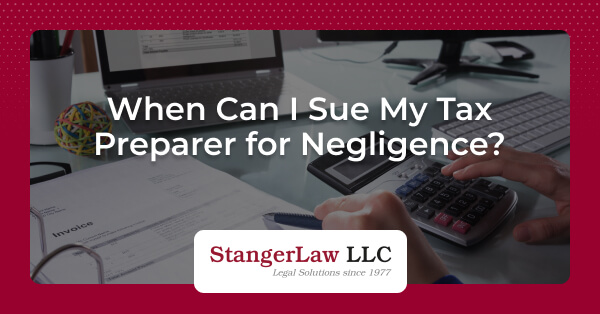When Can I Sue My Tax Preparer for Negligence?

Millions of Americans entrust a professional tax preparer with their tax records.
We assume they know the rules of the Internal Revenue Service (IRS) far better than we do and will prepare our returns properly.
But what happens when these tax preparers fail to do their job?
Such failure causes many to ask, Can I sue my tax preparer for negligence? The short answer is yes.
Our Connecticut accounting malpractice lawyers discuss the details in this article. We’ll also cover your potential options when your tax preparer makes a mistake.
If you need assistance or have questions, contact us online or call (860) 561-0651 today.
Our Practice is Limited to Connecticut
We handle two types of accounting malpractice claims (6 figures+):
- Claims for penalties and interest caused by failure to pay taxes due to accountant or attorney malpractice (we do not seek recovery of unpaid taxes that were rightfully owed).
- Claims for taxes wrongly paid due to accountant negligence, but only if the deadline for filing an amended return has passed.
Understanding When You Can Sue a Tax Preparer for Negligence
To know when you can sue your tax preparer, you need to know the four legal elements of negligence.
These elements are:
- Duty of care,
- Breach,
- Causation, and
- Damages.
Let’s unpack these elements in more detail.
Duty and Standard of Care

A standard of care refers to the minimally acceptable standards a professional must meet.
These standards vary by profession.
Tax preparers have to follow the Financial Accounting Standards Board’s (FASB) Generally Accepted Accounting Principles (GAAP) or Generally Accepted Auditing Standards (GAAS).
And if your tax preparer is a member of the American Institute of Certified Public Accountants (AICPA), they must follow AICPA’s code of professional conduct.
Comparing your tax preparer’s actions to these standards helps your lawyer evaluate whether or not a malpractice claim is viable.
Breach
Once we understand the standard of care, we can examine whether the tax preparer breached that standard.
Did your tax preparer follow GAAP or GAAS? Or did they make an obvious mistake that led to a critical error?
Causation
The third element involves connecting the tax preparer’s breach with the critical mistake.
You won’t prevail in your negligence claim if the tax preparer’s actions did not cause you harm as a result of an inaccurate or untimely tax return.
Damages
The final element assesses whether you suffered losses because of your tax preparer’s actions. You must demonstrate that the tax preparer’s breach caused you definite financial losses.
The services of an experienced Connecticut malpractice attorney are especially critical here.
Negligence Example: John’s Business Taxes
Let’s imagine a specific situation to gain more clarity.
John is a small business owner who retains a professional to prepare the tax return for his business.
While completing the tax return, the tax preparer mistakenly documents a purchase of $100,000 in business supplies as a $100,000 payment to the company because he ignores GAAP standards. The oversight causes John’s business to lose out on valuable deductions and pay additional taxes. The tax preparer had a duty (following GAAP) but failed to do so here.
The mistake was the sole cause of the business’s high tax liability and financial losses. Thus, John could likely prevail on a negligence claim.
Can I Sue My Tax Preparer for Not Filing My Taxes?
It depends. The question also revolves around whether your tax preparer’s action constitutes negligence. Of course, a tax preparer is generally responsible for filing your tax return on time.
However, there may be exceptions.
For instance, did you fail to pay your tax preparer? Did you give them all the documents they needed to assess your tax liabilities thoroughly?
If the tax preparer didn’t file your taxes even though you met all obligations and paid all necessary fees, you may have a solid legal claim. Consult an attorney for more information.
My Tax Preparer Made a Mistake. What Can I Do?
If you discover that your tax preparer made a mistake on your tax return, ask the following two questions:
- What did your tax preparer do wrong? Did they fail to file your taxes? Or did they make a small error on an incredibly complicated return?
- Why did your tax preparer make the mistake? Did your behavior in any way contribute to the error? Or did you meet your side of the bargain?
Once you understand exactly what went wrong and why, contact qualified legal counsel immediately. An experienced professional malpractice attorney can assess your case and provide an in-depth analysis of your legal options.
Contact an Experienced Connecticut Accounting Negligence Lawyer
An untimely tax return is often excellent grounds for a negligence claim. And a tax preparer liable for negligence must pay a penalty to compensate for your losses. That said, the best way to assess your chances of obtaining compensation is to consult an experienced, dedicated attorney.
Here at StangerLaw LLC, we’re passionate about getting justice for our clients. We’re also devoted to providing outstanding customer service. Let us assess your case and get you the compensation you deserve.
Fill out our online form or call us at (860) 561-0651 today to get started.
Unfortunately we do not recommend filing a suit for injuries of only a few thousand dollars. Yes that is real money, yet the costs can be prohibitive, in those cases where it is a more minor sum you can find this on the internet. Some professionals then become more concerned about beating you to stop the investigation by the state. This may not help you get paid.
Complaints may also be directed to the Connecticut State Board of Accountancy at 860-713-6100 or State Board of Accountancy, c/o Department of Consumer Protection, 165 Capitol Avenue, Hartford, CT 06106-1630.
We understand their goal is to police the profession while ours is about getting you the damages you deserve.
Related Post: